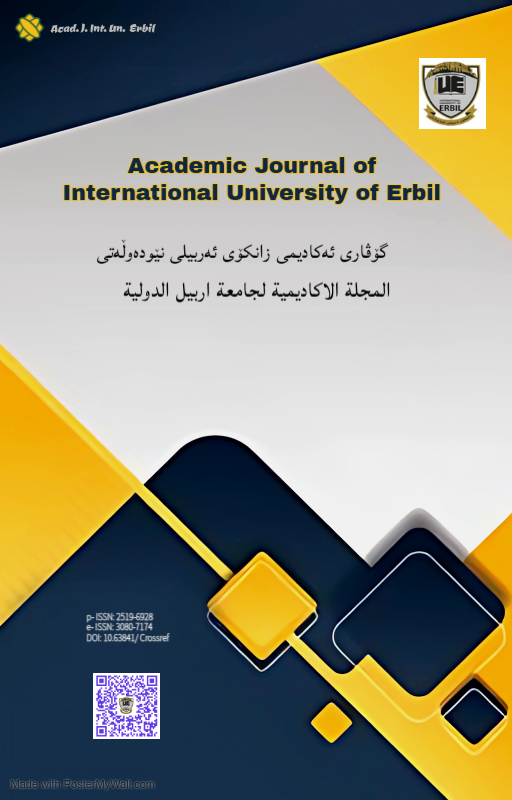The Role of Authentic Leadership on Enhancing Organizational Trust: An Analytical Study of the Opinion of Academic Staff in Colleges and Institutes in Soran Independent Administration in the Kurdistan Region of Iraq
Role of Authentic Leadership on Enhancing Organizational Trust
DOI:
https://doi.org/10.63841/iue22562Keywords:
Authentic Leadership, Organizational Trust, College & Institutes and Soran independent AdministrationAbstract
The focus of this study was to investigate the role of authentic leadership on enhancing organizational trust in college and institutes in Soran independent administration in KRI. The main objective of this research is to investigate the role of authentic leadership and its dimensions on enhancing organizational trust. A Descriptive method using quantitative technique (questionnaires) was employed to collect data from 183 academic staffs from 13 college and institutes in Soran independent administration in KRI. The study's findings highlight the crucial role of authentic leadership in fostering and cultivating organizational trust among academic staff. The results also confirmed that there is a significant correlation between authentic leadership and its dimensions (relational transparency, internal moral perspective, self-awareness, balance processing, and social-awareness), and organizational trust as a whole, furthermore the research shows that the impact of authentic leadership and its dimensions on organizational trust among academic staff statistically is significant, and balance processing has the greatest influence to make the academic staff to feel trust in their college and institutes. Finally, it is advisable to pursue qualitative method in the future, broadening the focus to include different groups such as employees in colleges and institutes. This approach will yield more comprehensive research findings and provide detailed insights.
Downloads
References
G. S. Lowe, “Creating a quality work environment: Results from the Health Sciences Association of Alberta work environment survey,” Edmonton, Alberta, Canada: Graham Lowe Group, 2006.
Z. M. Sadq, B. S. Ahmad, V. S. Saeed, B. Othman, and H. O. Mohammed, “The relationship between intellectual capital and organizational trust and its impact on achieving the requirements of entrepreneurship strategy (The case of Korek Telecom Company, Iraq),” International Journal of Advanced Science and Technology, vol. 29, no. 2, pp.2639-2653. 2020.
D. M. Rousseau, S. B. Sitkin, R. S. Burt, and C. Camerer, “Not so different after all: A cross-discipline view of trust,” Academy of management review, vol. 23, no. 3, pp.393-404.1998.
C. Celep, and O. E. Yilmazturk, “The relationship among organizational trust, multidimensional organizational commitment and perceived organizational support in educational organizations,” Procedia - Social and Behavioral Sciences, vol. 46, pp.5763 – 5776, 2012.
O. Akhunov, J. Eriksson, and A. Karlsson,“Employees´ Trust in Managers in a Downsized Organisation,”Bacholer dissertation, Kurdistan University, 2006.
B. J. Avolio, and W. L. Gardner, “Authentic leadership development: Getting to the root of positive forms of leadership,” The Leadership Quarterly, vol. 16, no. 3, 315–338, 2005. https://doi.org/10.1016/j.leaqua.2005.03.001
F. O. Walumbwa, B. J. Avolio, W. L. Gardner, T. S. Wernsing, and S. J. Peterson, S.J., “Authentic leadership: Development and validation of a theory-based measure,” Journal of management, vol. 34, no.1, pp.89-126.2008.
B. J. Avolio, W. L. Gardner, F. O. Walumbwa, F. Luthans, and D. R. May,“ Unlocking the mask: A look at the process by which authentic leaders impact follower attitudes and behaviors,” The leadership quarterly, vol. 15, no. 6, pp.801-823. 2004.
F. Luthans, and B. J. Avolio, “Authentic leadership development,” Positive organizational scholarship, vol. 241, no. 258, pp.1-26, 2003.
F. Luthans, and C. M Youssef, “Human, social, and now positive psychological capital management: Investing in people for competitive advantage,” University of Nebraska, Management Department Faculty Publications, no. 154, 2004. https://digitalcommons.unl.edu/managementfacpub/154
M. H. Kernis,“ Toward a conceptualization of optimal self-esteem,” Psychological inquiry, vol. 14, no. 1, pp.1-26, 2003.
W. L. Gardner, B. J. Avolio, F. Luthans, D. R. May, and F. Walumbwa, “Can you see the real me? A self-based model of authentic leader and follower development,” The leadership quarterly, vol. 16, no. 3, pp.343-372. 2005.
B. J. Avolio, and F. Walumbwa, and T. J. weber, “Leadership: current theories, research, and future directions” Annu Rev Psychol, vol. 60, 421-449. 2009. doi: 10.1146/annurev.psych.60.110707.163621
F. O. Walumbwa, P. Wang, H. Wang, J. Achaubroeck, and B. J. Avolio, “Retracted: Psychological processes linking authentic leadership to follower behaviors,” The leadership quarterly, vol. 21, no. 5, 2010.
M. Popper, and R. Lipshitz, “Installing mechanisms and instilling values: the role of leaders in organizational learning,” The Learning Organization, vol. 7, no. 3, pp.135-145, 2000.
P. G. Northouse, “Leadership: Theory and practice,” (6th ed.). Thousand Oaks, CA: Sage Publications. 2013.
Aristotle Nicomachean Ethics. (W. D. Ross, Trans.) Batoche Books, Kitchener, 1999. Retrievedfromhttps://socserv2.socsci.mcmaster.ca/econ/ugcm/3ll3/aristotle/Ethics.pdf.
A. K. Cronin, “How al-Qaida ends: The decline and demise of terrorist groups,” International Security, vol. 31, no. 1, pp.7-48. 2006.
W. L. Gardner, and B. J. Avolio, “The charismatic relationship: A dramaturgical perspective,” Academy of management review, vol. 23, no. 1, pp.32-58. 1998.
R. Ilies, F. P. Morgeson, and J. D. Nahrgang, “Authentic leadership and eudaemonic well-being: Understanding leader–follower outcomes,” The leadership quarterly, vol. 16, no. 3, pp.373-394, 2005.
J. Dangmei, and A. Singh, “How aesthetic leadership style might relate to employee morale at workplace? An analytical study,” Asia Pacific Journal of Research, vol. 1, pp. 203-206, 2017.
E. J. Austin, D. Farrelly, C. Black, and H. Moore, “Emotional intelligence, Machiavellianism and emotional manipulation: Does EI have a dark side?,” Personality and individual differences, vol. 43, no. 1, pp.179-189. 2007.
L. T. Eby, D. M. Adams, J. E. Russell, and S. H. Gaby, “Perceptions of organizational readiness for change: Factors related to employees' reactions to the implementation of team-based selling,” Human relations, vol. 53, no. 3, pp.419-442. 2000.
R. J. Reichard, and S. K. Johnson, “Leader self-development as organizational strategy,” The Leadership Quarterly, vol. 22, no. 1, pp. 33–42, 2011.
J. M. Podolny, R. Khurana, and M. Hill-Popper, “Revisiting the meaning of leadership,” Research in Organizational Behavior, vol. 26, pp.1–36, 2010.
P. Shockley-Zalabak, K. Ellis, and G. Winograd, G., “Organizational trust: What it means, why it matters,” Organization Development Journal, vol. 18, no. 4, p.35, 2000.
M. A. Korsgaard, A. H. Pitariu, and S. S. Jeong, “Trust in management: An interpersonal perspective,”The Sage handbook of organizational behavior, vol. 1, pp.89-105, 2008.
S. Maguire, and N. Phillips, “Citibankers’ at Citigroup: a study of the loss of institutional trust after a merger,” Journal of Management Studies 45(2): 372–401, 2008.
H. H. Tan, and C. S. Tan, “Toward the differentiation of trust in supervisor and trust in organization,” Genetic, social, and general psychology monographs, vol. 126, no. 2, p.241, 2000.
N. Ferres, J. Connell, and A. Travaglione, “Co‐worker trust as a social catalyst for constructive employee attitudes,” Journal of Managerial Psychology, vol. 19, no. 6, pp.608-622. 2004.
H. H. Tan, and A. K. Lim, “Trust in coworkers and trust in organizations,” The Journal of Psychology, vol. 143, no. 1, pp.45-66, 2009.
R. H. Searle, and G. Dietz, “Trust and HRM: Current insights and future directions,” Human resource management journal, vol. 22, no. 4, pp.333-342. 2012.
Ş. Sarıkaya, and B. K. Kara, “Organizational trust and organizational support as a predictor of job satisfaction,” International journal of curriculum and instruction, vol. 12, pp.435-466, 2020.
P. Alleyne, M. Hudaib, and R. Haniffa, “ The moderating role of perceived organisational support in breaking the silence of public accountants,” Journal of Business Ethics, vol. 147, pp. 509-527. 2018.
M. W. Akhtar, F. Syed, M. Husnain, and S. Naseer, “Person-organization fit and innovative work behavior: The mediating role of perceived organizational support, affective commitment and trust,” Pakistan Journal of Commerce and Social Sciences (PJCSS), vol. 13, no. 2, pp. 311-333, 2019.
C. Andrade, and P. C. Neves, “Perceived organizational support, coworkers’ conflict and organizational citizenship behavior: The mediation role of work-family conflict,” Administrative Sciences, 12(1), 20. 2022
T. S. Putra, and A. D. Pramusiwi, “Well-Being and Innovation: Investigating the Linkage among Well-Being Oriented Management, Knowledge Sharing, Innovation Climate, and Innovative Work Behavior,” Media Ekonomi dan Manajemen, vol. 38, no. 1, pp. 147-160. 2023.
İ.K. Tüzün, “Trust, organizational trust and organizational trust models,” Karamanoğlu Mehmetbey University Journal of Social and Economic Research, vol. 2007, no. 2, pp. 93-118, 2007. (In Turkish)
J. Balogun, “In Exploring strategic change, 3rd ed,” V. H. Hailey, and K. Scholes, (editors), Prentice-Hall, London, U. K., 2008.
D. L. McLain, D. L., and K. Hackman, “Trust, risk, and decision-making in organizational change,” Public Administration Quarterly, vol. 23, pp.152–176, 1999.
A. K. Mishra, and G. M. Spreitzer, G. M., “Explaining how survivors respond to downsizing: The roles of trust, empowerment, justice and work redesign,” Academy of Management Review, vol. 23, pp. 567–588, 1998.
S. Oreg, J. M. Bartunek, G. Lee, and B. Do, “An affect-based model of recipients’ responses to organizational change events,” Academy of Management Review, vol. 43, pp. 65–86, 2018.
L. Huff, and L. Kelley, L., “Levels of organizational trust in individualist versus collectivist societies: a seven-nation study,” Organization Science, vol. 14, no. 1, pp. 81-90, 2003.
S. Altuntas, and U. Baykal, “Relationship between nurses’ organizational trust levels and their organizational citizenship behaviors,” Journal of nursing scholarship, vol. 42, no. 2, pp.186-194, 2010.
E. M. Whitener, S. E. Brodt, M. A. Korsgaard, and J. M. Werner, “Managers as initiators of trust: An exchange relationship framework for understanding managerial trustworthy behavior,” Academy of management review, vol. 23, no. 3, pp.513-530, 1998.
M. A. Korsgaard, D. M. Schweiger, and H. J. Sapienza, “Building commitment, attachment, and trust in strategic decision-making teams: The role of procedural justice,” Academy of Management journal, vol. 38, no. 1, pp.60-84, 1995.
E. A. Lind, J. Greenberg, K. S. Scott, and T. D. Welchans, “Litigation and claiming in organizations,” Antisocial behavior in the workplace, pp.150-171, 1997.
D. J. McAllister, “Affect-and cognition-based trust as foundations for interpersonal cooperation in organizations” Academy of management journal, vol. 38, no. 1, pp. 24-59. 1995.
J. Fulk, A. P. Brief, and S. H. Barr, “Trust-in-supervisor and perceived fairness and accuracy of performance evaluations,” Journal of Business Research, vol. 13, no. 4, 1985.
J. A. Gilbert, and T. L. P. Tang, T.L.P., “An examination of organizational trust antecedents,” Public personnel management, vol. 27, no. 3, pp. 321-338, 1998.
L. L. Cummings, and P. Bromiley, “The Organizational Trust Inventory (OTI): Development and Validation,” In R. M. Kramer and T. R. Tyler (eds.), Trust in organizations: Frontiers of theory and research (pp. 302 330). Sage Publications, Inc. https://doi.org/10.4135/9781452243610.n15, 1996.
T. Devos, D. Spini, and S. H. Schwartz, “Conflicts among human values and trust in institutions,” British journal of social psychology, vol. 41, no. 4, pp. 481-494, 2002.
S. Kiffin-Petersen, and J. Cordery, “Trust, individualism and job characteristics as predictors of employee preference for teamwork,” International Journal of Human Resource Management, vol. 14, no.1, pp.93-116. 2003.
M. Saunders, P. Lewis, and Thornhill, A., 2003. Research methods forbusiness students. Essex: Prentice Hall: Financial Times.
J. Y. Jung, “The effect of authentic leadership of deans and directors on sustainable organizational commitment at universities: mediated by organizational culture and trust,” Sustainability, vol. 14, no. 17, p.11051. 2022.
D. S. Wang, and C. C. Hsieh, “The effect of authentic leadership on employee trust and employee engagement,” Social Behavior and Personality: an international journal, vol. 41, no. 4, pp. 613-624, 2013.
R. Wahyuni, and A. Rahyuda, “The Effect of Authentic Leadership on Organizational Citizenship Behaviors Mediated by Trust in Leaders,” Indonesian Journal of Economics, Social, and Humanities, vol. 3, no. 2, pp. 105-116, 2021.
M. Farrokhi, and Z. Amiri, “The Impact of Authentic Leadership on Organizational Trust of Employees (Case Study: Isfahan charities),” Journal of Endowment & Charity Studies, vol. 1, no. 2, pp. 173-188, 2023.
M. Yasir, R. Imran, M. K. Irshad, N. A. Mohamad, and M. M. Khan, “Leadership Styles in Relation to Employees’ Trust and Organizational Change Capacity: Evidence From Non-Profit Organizations” SAGE Open, vol. 6, no. 4, 2016. https://doi.org/10.1177/2158244016675396
Downloads
Published
Issue
Section
License
Copyright (c) 2025 Academic Journal of International University of Erbil

This work is licensed under a Creative Commons Attribution 4.0 International License.












